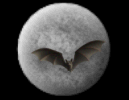|
John:
We are creatures of light. We depend on sunlight to power the earth’s biochemical reactions and, in turn, to make our existence known. But if as much as 99 percent of the universe is essentially invisible. Should we of the 1 percent congratulate ourselves on being clever enough to discern the rest? We evolved on the earth with a marvelous ability to find patterns. But our brains were not selected for their ability to understand quantum mechanics or particle physics. Hence, there is the constant danger that we are being too clever, too good at absorbing discrepancies into our theoretical inventions. We cannot always know when, like Ptolemy, we are adding epicycles, elaborations to keep our theories standing.
Yet we maintain the convection -- or at least as a working hypothesis -- that we can comprehend the whole. So vivid is the picture we have drawn of the heavens -- with its stunningly brilliant quasars, its Magellanic Clouds thousands of light-years away, its black holes so unfathomably deep that they gobble up light -- that beings from other worlds reading our science literature might think we had traveled great distances. But, in fact, we have sent space probes no farther than just beyond the solar system, we have stepped no farther than the moon. The rest of the picture is built from the photons that happen to come our way -- magnified by telescopes, sifted for patterns, theorized into empty conceptual space.
But what a false sense this gives us of the scientific quest, of what is inevitably a never-ending effort to map our inner and outer worlds. And yet, faced with a universe more complex than the brains trying to capture it in their mesh, scientists continue the struggle to sort order from randomness. And in the process, some of these scientists have gone even further, examining more closely just what we mean by "randomness" and "order" in the first place, and why it is that we have science at all. And when these cosmologists and particle physicists look upon the grand architectures of science with the advantage of hindsight, developments take an even more illusory sense of inevitability, as though the picture that has emerged, with all its strengths and weaknesses, is only one of many that could have been.
Hence, when we read in the history books how the great Harlow Shapley believed that the Milky Way was the universe, we want to grab his hand and say, "No. Don’t you see? Those nebulae that look so small and nearby are really huge distant galaxies." We struggle in vain to imagine what it would have been like to be in his shoes -- or in Thomson’s or Rutherford’s -- observing the phenomena without the filters that would later channel everything we see. But if we could go back in time and see scientific enterprise through their eyes, perhaps we would have an even stronger sense of science as a glorious human construction, an artful fitting of data into a carefully crafted mental framework, a construction of towers that just possibly might have been built another way.
B. L. Nelson
Science Producer, National Pubic Radio (NPR)
Benjamin_Nelson@WPBA.pbs.org
Lecturer, Harvard University School of Scientific Computation |



